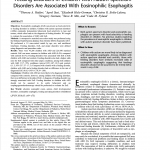Autism and Migraine: An Unexplored Association?
Autism spectrum disorder is characterized by neurological, psychiatric and medical comorbidities—some conditions co-occur so frequently that comorbidity in autism is the rule rather than the exception. The most common autism co-occurring conditions are intellectual disability, language disorders, attention-deficit hyperactivity disorder, epilepsy, gastrointestinal problems, sleep disorders, anxiety, depression, obsessive-compulsive disorder, psychotic disorders, oppositional defiant disorder, and eating disorders. They are well known and studied. Migraine is the most common brain disease in the world, but surprisingly only a few studies investigate the comorbidity between autism and migraine. The aim of this narrative review is to explore the literature reports about the comorbidity between autism and migraine and to investigate the common neurotransmitter, immune, anatomical and genetic abnormalities at the base of these two conditions.
View File here:
You need to login or register to bookmark/favorite this content.



